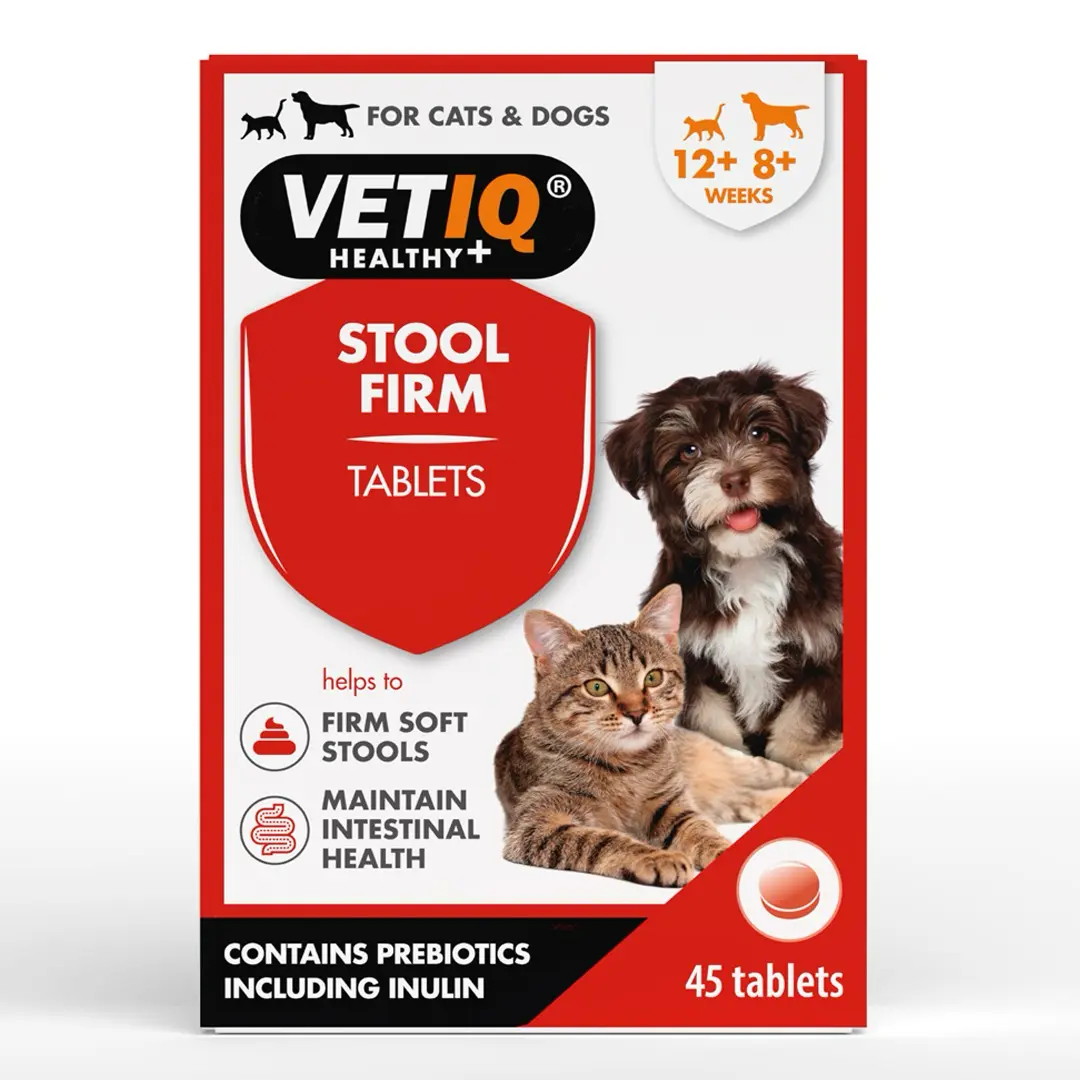What should I give a dog with an upset stomach?! It’s a question most dog owners face at some point! Whether it’s from a dietary mishap or something more serious, an upset stomach can usually be eased with the right care and some clever strategies!
In this article, we cover what you should and shouldn’t give your dog if their tummy is poorly, so you can help your furry friend get back on their paws, pronto!
What should I give a dog with an upset stomach? Start by recognising the symptoms!
Recognising the signs of an upset stomach is the first step in helping your dog feel better, so be on the lookout for:
- Mild diarrhoea
- Vomiting
- Lethargy
- Reluctance to eat or drink
- Excessive or unusual flatulence
- Loss of appetite
While these signs can be concerning, they often signal that your dog’s digestive system is reacting to something it didn’t tolerate well, like a new food, a sudden dietary change, or something scavenged on a walk.
Understanding when to treat at home and when to call the vet is key. If symptoms are mild and resolve within 24-48 hours, simple home care, like dietary changes and hydration, can usually help. But if your dog’s condition worsens, if you notice signs of abdominal pain, or if symptoms persist beyond two days, you should consider getting veterinary attention.
Keep an eye on your dog’s energy levels, demeanour, and any signs of visible discomfort. Severe lethargy or ongoing distress should never be ignored. Being proactive and observant allows you to act swiftly and appropriately, whether that means offering a bland meal or making a timely trip to the vet.
Safe home remedies – What should I give a dog with an upset stomach?
Several gentle and effective home remedies can help settle your dog’s stomach. The right approach will depend on what’s caused the upset, how long symptoms have lasted, and your dog’s overall condition.
Let’s take a closer look at three key home care areas, diet, hydration, and light exercise, to help your dog feel better faster!
Dietary adjustments for quick relief
Changing your dog’s diet is often the most effective way to calm an upset stomach. Switching to a bland diet can ease digestive irritation and support a quicker recovery. Reach for foods which are gentle, easy to digest, and unlikely to trigger further discomfort, such as:
- Boiled chicken
- White rice
- Brown rice (super nutritious!)
- Canned pumpkin (great for regulating digestion due to its fibre!)
When offering a bland diet, start with small, frequent meals to avoid overwhelming your dog’s system. Gradually increase portion sizes as their symptoms improve. Feed in a quiet, calm setting and be mindful of your dog’s food preferences to encourage eating without stress.
For dogs on dry or raw food diets, lightly processed options like cold-pressed kibble or carefully selected raw meals can also be easier on the stomach and suitable for sensitive systems.
Hydration is key
Hydration is essential when your dog has an upset stomach, especially if they’re losing fluids through vomiting or diarrhoea. Even mild dehydration can quickly become serious, so it’s important to encourage fluid intake.
Enhance your dog’s drinking water by adding a splash of low-sodium bone broth or offering rice water (the liquid left over from boiling white rice), both of which are soothing and hydrating. If the weather is warm, you can also let them suck ice cubes!
After fasting or a period of reduced intake, offer small amounts of water frequently rather than letting them gulp large quantities at once, which could further upset their stomach.
Gentle exercise
While rest is important, gentle activity can also support your dog’s recovery. Short, slow walks can stimulate digestion, relieve mild bloating, and boost their mood.
Here are a few tips for safe, beneficial exercise:
- Wait at least two hours after eating before walking
- Stick to low-impact activities like a short lead walk
- Keep outings calm and avoid overexertion
- Skip dog park visits or playdates until they’ve fully recovered
A bit of fresh air and movement can go a long way in helping your dog feel better, mentally and physically. Just be sure not to push them beyond what they’re ready for; recovery should always be gentle and paced!
Foods and items to avoid
While it’s tempting to offer your dog treats or bits of food to encourage eating, some common items can worsen symptoms or be outright dangerous.
Avoid the following:
- Dairy products: Many dogs are lactose intolerant, which can worsen diarrhoea or vomiting
- Fatty foods: These can irritate the gut and lead to pancreatitis
- Spicy foods: Can upset the stomach and trigger more discomfort
Toxic foods to completely avoid at all times include:
- Chocolate
- Grapes and raisins
- Onions and garlic
During recovery, stick to a simple, bland diet. Avoid introducing new foods while your dog’s stomach is still sensitive. Once symptoms have resolved, reintroduce their regular food gradually to avoid shocking their system.
When should you seek veterinary advice?
Most mild stomach upsets pass with rest and simple care, but some situations require a professional’s help. Call your vet if:
- Symptoms last more than 24-48 hours
- There’s blood in vomit or stool
- Your dog is extremely lethargic or unresponsive
- They show signs of pain or distress
If your dog is a puppy, senior, or has an underlying condition, don’t wait – seek help right away. Chronic digestive issues could indicate conditions like inflammatory bowel disease, parasites, or other serious problems that need diagnosis and treatment.
Trust your instincts; if something feels off, it’s better to check with a vet than to wait and risk complications. Acting early can mean a faster, safer recovery for your dog!
What should I give a dog with an upset stomach? Give them an effective, vet-approved solution!
Helping your dog recover from an upset stomach starts with recognising the signs early and providing gentle home care. By adjusting their diet, keeping them hydrated, and encouraging light activity, you can help ease discomfort and speed up recovery. But having a proven, vet-approved solution ready at home means you can act even faster when digestive issues strike.
VETIQ Stool Firm Tablets are specially formulated to firm stools, soothe the digestive tract, and restore gut balance:
- Firms soft or watery stools for better comfort and easier clean-up
- Soothes digestive upset with pectin and pumpkin for natural fibre
- Supports gut health with prebiotic fibre (Inulin) to encourage good bacteria
- Absorbs toxins using kaolin to restore intestinal balance
- Protects the gut wall with calcium carbonate to maintain a healthy barrier
- Boosts overall well-being with beta-carotene for vitality and coat health
- Relieves common symptoms like mild diarrhoea, flatulence, reluctance to eat, and lethargy
- Easy to give as an oral tablet for quick, stress-free administration
- Safe for puppies from 8 weeks
With VETIQ Stool Firm Tablets in your pet care kit, you’ll be ready to tackle your dog’s digestive troubles quickly, keep their tail wagging, and get them back to their happy, healthy self!









